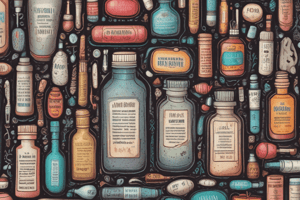Podcast
Questions and Answers
What is the primary treatment for a suspected drug-induced skin reaction?
What is the primary treatment for a suspected drug-induced skin reaction?
- Prescribing oral antihistamines to relieve pruritus
- Administering acetaminophen to control fever
- Applying topical corticosteroids to the affected area
- Discontinuing the suspected drug and avoiding cross-sensitizers (correct)
What is the recommended treatment for pruritus in a drug-induced skin reaction?
What is the recommended treatment for pruritus in a drug-induced skin reaction?
- NSAIDs and antihistamines
- Acetaminophen and aspirin
- Topical corticosteroids and oral antihistamines (correct)
- Systemic corticosteroids
What is the typical outcome of maculopapular reactions after discontinuing the drug?
What is the typical outcome of maculopapular reactions after discontinuing the drug?
- They are resistant to treatment
- They disappear within a few days (correct)
- They require systemic corticosteroids
- They persist for several weeks
What is the recommended treatment for high fever in a drug-induced skin reaction?
What is the recommended treatment for high fever in a drug-induced skin reaction?
What is the outcome of photosensitivity reactions after discontinuing the drug?
What is the outcome of photosensitivity reactions after discontinuing the drug?
Study Notes
Nonimmune Drug Hypersensitivity Reactions
- Vancomycin infusion can cause pruritus and an erythematous rash involving the face, neck, and "red man" reaction when administered over less than 1 hour.
Life-threatening Cutaneous Drug Reactions
- Examples of life-threatening drug reactions include Stevens-Johnson syndrome (SJS), Toxic Epidermal Necrolysis (TEN), and Drug Reaction with Eosinophilia and Systemic Symptoms (DRESS) or Drug-induced Hypersensitivity Syndrome (DIHS).
Drug-induced Hyperpigmentation
- Can be caused by increased melanin (e.g., hydantoins) or direct deposition (e.g., silver, mercury, tetracyclines, and antimalarials).
Drug-induced Photosensitivity Reactions
- Can be phototoxic (nonimmunologic reaction) or photoallergic (immunologic reaction).
- Medications associated with phototoxicity include amiodarone, tetracyclines, sulfonamides, and coal tar.
- Common causes of photoallergic reactions include sulfonamides, sulfonylureas, thiazides, nonsteroidal anti-inflammatory drugs (NSAIDs), chloroquine, and carbamazepine.
Radiocontrast Media
- Can cause serious, immediate nonimmune hypersensitivity reactions, such as urticaria/angioedema, bronchospasm, shock, and death.
- Reactions occur in 0.7% to 3% of patients.
- Typical protocols include pre-treatment with prednisone and diphenhydramine.
Opiates
- Stimulate mast cell mediator release directly, resulting in pruritus and urticaria with occasional mild wheezing.
- Pre-treatment with an antihistamine may reduce these reactions.
Cancer Chemotherapy
- Hypersensitivity reactions have occurred with all chemotherapy agents.
- IgE-mediated type I reactions are the most common.
- Reactions are most common with taxanes, platinum compounds, asparaginases, and epipodophyllotoxins.
- To reduce the risk, patients are routinely premedicated with corticosteroids and H1- and H2-receptor antagonists.
Anticonvulsants
- Can cause a wide range of hypersensitivity reactions, ranging from mild maculopapular skin eruptions to severe life-threatening reactions.
Treatment of Drug-induced Skin Reactions
- Discontinuing the suspected drug as quickly as possible and avoiding use of potential cross-sensitizers is the most important treatment.
- Controlling symptoms (e.g., pruritus) is the next step.
- Systemic corticosteroids may be warranted in severe cases.
- Photosensitivity reactions typically resolve with drug discontinuation.
Studying That Suits You
Use AI to generate personalized quizzes and flashcards to suit your learning preferences.
Description
This quiz covers hypersensitivity reactions to certain medications, specifically vancomycin infusion and the associated skin reactions.




